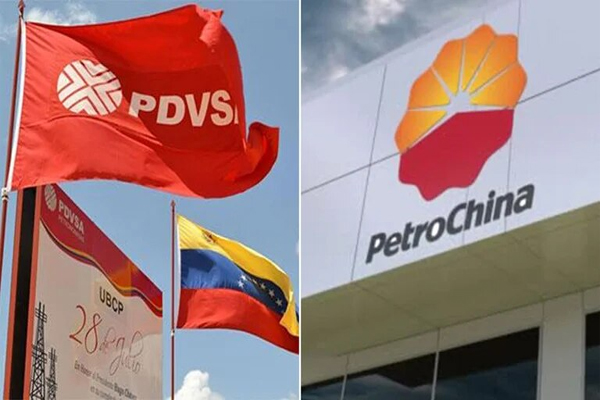
Marianna Parraga and Chen Aizhu, Reuters
HOUSTON/SINGAPORE
EnergiesNet.com 11 03 2023
China’s PetroChina (601857.SS) is proposing to buy up to 8 million barrels a month of Venezuelan crude from state-run oil company PDVSA, according to four people familiar with the matter, hoping to resume a trade suspended four years ago by U.S. sanctions.
In October, the U.S. Treasury Department temporarily lifted the sanctions, paving the way for Venezuela to resume exporting crude, gas and fuel to its best customers. Washington has said the six-month reprieve hinges on Venezuela’s government embracing a fair and open presidential election next year.
Since the measures were relaxed, some companies that had acquired Venezuelan oil prior to sanctions have sought to revive those deals.
PetroChina, China’s second-largest oil refiner, has offered yuan payment for about 265,000 barrels per day (bpd) of Venezuelan crude through its joint ventures with PDVSA, which would allow them to rebuild cashflow and capital for production investment, two of the sources said.
“They are working on it,” said a person close to PetroChina. The company before sanctions was taking up to six 2 million-barrel cargoes of Venezuelan oil per month.
PDVSA and PetroChina did not immediately reply to requests for comment.
Following the U.S. measures, China’s government called for a total lifting of sanctions on Venezuela. President Nicolas Maduro traveled with a large delegation to China in September to re-launch bilateral trade, with a heavy emphasis on restoring direct energy trade.
Washington first imposed sanctions on Venezuela’s oil sector in 2019 and later banned non-U.S. customers from buying its oil, disrupting the business between PDVSA and Chinese state firms including China National Petroleum Corp (CNPET.UL) and PetroChina.
Those agreements had allowed Venezuela to pay debt off by delivering oil cargoes.
PetroChina’s new proposed deal could temporarily isolate the crude trade between the two oil companies from the wider Caracas-Beijing bilateral agreements on debt repayments, whose linked oil supply contracts are set to expire in 2024, documents seen by Reuters showed.
A delegation from defense firm China Aerospace Science and Industry Corp (CASIC), is in Caracas separately pursuing oil cargoes, one of the people said. State-run CASIC has received Venezuelan oil in recent years as debt service payment.
NOT AN EASY ROAD
Recent meetings in Caracas have not led to final agreements with China yet. PDVSA’s first reaction to PetroChina’s proposal was to say it would not be immediately possible to comply with a 265,000-bpd commitment, one of the people said.
Venezuela’s crude output has slightly increased to 780,000 bpd so far this year, but it remains well below an annual goal of 1 million bpd this year.
China’s independent refineries have in recent years imported Venezuelan oil through middlemen, whose role reduces PDVSA’s take by their expensive freight tariffs, taxes, and heavy price discounts.
Exports of Venezuelan oil to China averaged 430,000 bpd this year, directly and through trans-shipment hubs, according to PDVSA’s documents and tanker tracking.
Any new supplies to PetroChina could take over as much as two-thirds of the Venezuelan oil barrels currently sold to China’s small-scale “teapot” refiners.
PetroChina’s payment proposals have included open credit or letters of credit, but PDVSA wants any new deal to include prepayment in cash or by oil swaps, the person said.
Stalled negotiations could see the clock run out on the six-month U.S. license that expires in April. President Joe Biden’s administration could also revoke the easing of the sanctions if it sees no progress towards a fair election in Venezuela.
Reporting by Marianna Parraga in Houston and Aizhu Chen in Singapore; Editing by Lisa Shumaker and Jan Harvey
reuters.com 11 02 2023












